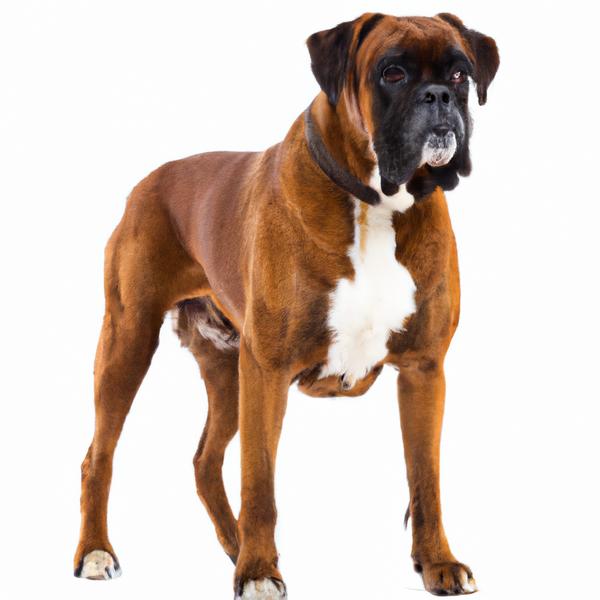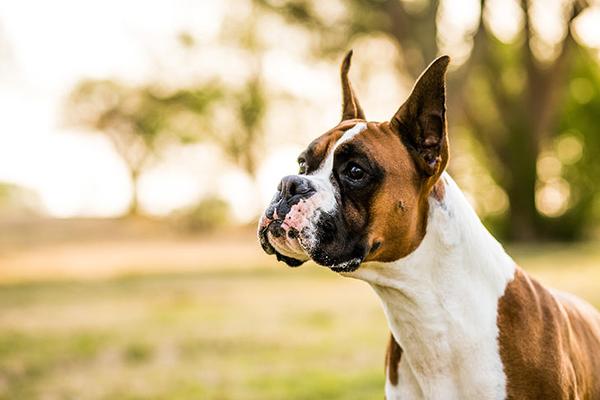Boxer
also known as Deutscher Boxer, German Boxer

 Summary
Summary
The Boxer is a medium-sized breed of dog that originated in Germany in the late 19th century. The breed was developed by crossing the English Bulldog and the German Bullenbeisser, and was used primarily as a hunting and working dog. The Boxer was first registered with the AKC in 1904.
Breed Information
Is Boxer a purebred?
Purebred
What were Boxers originally used for?
Bullbaiting, Guarding, Fighting
How Long Do Boxers Live? What is average life expectancy for a Boxer? How long can Boxers live?
10-12 years
The average Boxer lifespan is somewhere between 10-12 years, provided they aren't beset by any exceptional health issues or injuries.
Boxer Height & Weight
How big is a full grown Boxer?

| Height | ||||
|---|---|---|---|---|
| Average | 6 months | 12 months | 18 months | |
| Male | 22-25 inches (55.9 - 63.5 cm) | 20.0 inches (50.8 cm) | 22.0 inches (55.9 cm) | 23.5 inches (59.7 cm) |
| Female | 21-23 inches (53.3 - 58.4 cm) | 19.0 inches (48.3 cm) | 21.0 inches (53.3 cm) | 22.0 inches (55.9 cm) |
| Weight | ||||
|---|---|---|---|---|
| Average | 6 months | 12 months | 18 months | |
| Male | 65-80 pounds (29 - 36 kg) | 47.5 pounds (22 kg) | 60.0 pounds (27 kg) | 72.5 pounds (33 kg) |
| Female | 50-65 pounds (23 - 29 kg) | 37.5 pounds (17 kg) | 47.5 pounds (22 kg) | 57.5 pounds (26 kg) |
Do Boxers get fat easily?
![]()
![]()
![]()
![]()
![]()
The Boxer is a breed that has an average to high tendency to gain weight if their weight is not closely monitored. It is important to maintain a balance between exercise and food intake to keep them at a healthy weight. This can be achieved by scheduling at least one daily walk and engaging in regular playtime with them.
Are Boxers Hypoallergenic?
No
Unfortunately, the Boxer is not hypoallergenic, making it not a good choice for a dog lover who suffers from pet allergies.
What is a Boxer personality? What are Boxer dogs best known for?
Brave
Confident
Fearless
Intelligent
Playful
Bright
Energetic
Friendly
Loyal
Are Boxers heavy shedders? How Much Does a Boxer Shed?
![]()
![]()
![]()
![]()
![]()
Boxer dogs are not heavy shedders, but they will lose a significant amount of hair each year. To decrease the amount of shedding, you can regularly brush your Boxer. This will remove loose hair and keep his coat growing in the same direction.
What is the watchdog ability of a Boxer dog?
![]()
![]()
![]()
![]()
![]()
The Boxer dog is one of the best choice if you want a good watchdog. This breed will keep watch over you and your family at all times. This breed takes this task seriously and will typically perform its guarding duty with little to no training. This dog will require obedience training, or you can consider guard dog training to sharpen its skills.
Breed History
Where do Boxers come from?
Germany
What are Boxers descended from?
Mastiff, Livestock Dog
What organizations or kennel clubs recognize/register the Boxer breed?
American Canine Registry
American Kennel Club
America's Pet Registry
Canadian Kennel Club
Dog Registry of America Inc.
Federation Cynologique Internationale
Kennel Club of Great Britain
North American Purebred Registry, Inc.
American Canine Association, Inc.
Australian National Kennel Council
Continental Kennel Club
National Kennel Club
New Zealand Kennel Club
United Kennel Club
Canadian Canine Registry
When were Boxers first bred? How old is the Boxer breed?
1800s
What Breed Group is a Boxer?
Working (AKC:1904)
Guardian (UKC)

Boxer Appearance
What color are Boxer eyes?
Brown
What color can Boxer nose be naturally?
Black
What color can Boxer coat be naturally?
Black
White
Fawn
Brindle
How long is a Boxers coat?
![]()
![]()
![]()
![]()
![]()
Boxers are known for their short coat.
How Dense Is The Boxer Coat?
![]()
![]()
![]()
![]()
![]()
What is the texture of the hair of a Boxer?
Straight
How many puppies can a Boxer have in a litter? How many puppies can a Boxer have in her first litter?
10-12 puppies per pregnancy
A Boxer can have a litter of 10-12 puppies on average. However, it's worth noting that the size of the litters can vary greatly. Factors that can influence litter size include the health of the mother, breeding history, and genetics.
![]()
![]()
![]()
![]()
![]()
The adaptability of Boxer dogs is a well-known trait, they are known for being able to adjust well to different living environments and lifestyle changes.

Boxer Health Issues
Do Boxers have a lot of health problems?
![]()
![]()
![]()
![]()
![]()
The Boxer is generally considered to be healthy. However, like all breeds, they are susceptible to certain health issues and it is important to keep an eye out for them and address them with your veterinarian as needed.
What are the major health concerns to be aware of when owning a Boxer?
Cardiomyopathy
Subvalvular Aortic Stenosis
Corneal Opacities
Degenerative Myelopathy
What are the less significant issues to keep in mind when it comes to Boxers?
Gastric Torsion
Colitis
Hip And Elbow Dysplasia
Cvi (Wobbler’S Syndrome)
Von Willebrand's Disease
Hypothyroidism
What are the occasional tests recommended for Boxer breed?
Cardiac
Hip
Blood
Thyroid Tests
X-Rays
MRI
Eye Examination

Boxer Needs and Activities
Do Boxers have a lot of energy?
![]()
![]()
![]()
![]()
![]()
Boxers are high-energy dogs, thus an active lifestyle suits them well.
Do Boxers need socialization? How social are Boxers?
![]()
![]()
![]()
![]()
![]()
Boxer have very high social needs. These needs include regular mental and physical stimulation, a job or purpose, and companionship. They thrive in environments where they have a lot of interaction with humans and other dogs.
How much exercise should Boxers get?
![]()
![]()
![]()
![]()
![]()
The Boxer dog needs significant physical activity to maintain a healthy lifestyle. They are also well-suited for those who lead an active lifestyle and enjoy activities such as running, hiking, or other outdoor pursuits.
How much sleep should a Boxer have? Do Boxers sleep a lot?
![]()
![]()
![]()
![]()
![]()
Boxers are active dogs that don't require as much sleep as other breeds. However, they still need enough sleep to stay healthy.
Does a Boxer drool a lot?
![]()
![]()
![]()
![]()
![]()
The Boxer is a dog that is known for its low drooling tendency. If you dislike drool marks on your clothing, the Boxer could be a suitable choice for you.
How much does it bark?
![]()
![]()
![]()
![]()
![]()
Boxer dogs tends to bark less frequently than most other dogs. They tend to be quieter and less vocal than other breeds. They may only bark when necessary, such as to alert their owner of something or to communicate something. They do not bark excessively, and may not bark as much as other dogs in certain situations, such as when they are left alone.
Do Boxers exhibit aggressive behavior to safeguard their home and territory? Do they possess a natural tendency to guard?
![]()
![]()
![]()
![]()
![]()
These dogs are known for being extremely protective and make excellent guard dogs. They possess a strong instinct to defend their territory and owners and have a high level of vigilance and alertness.
Are Boxers mouthy?
![]()
![]()
![]()
![]()
![]()
What is the likelihood of a Boxer running away? Do they have a tendency to explore or wander frequently?
![]()
![]()
![]()
![]()
![]()
Do Boxer dogs have a high prey drive?
![]()
![]()
![]()
![]()
![]()
What do Boxers enjoy doing? How do I keep my Boxer busy?
Walk, Run, Jog, Training, Grooming, Eating out, Wubba, Fetch, Hike, Running, Walking, Petting, Sniffing, Digging, Eating Snacks, Jumping, Jumping around, Walks, He liked to run, Back rubs, Fast walking, Playing, Hiking, Playing catch, Cuddling, Chase, Tug-of-war, Chew, Nap, Go to Park
What is the energy level of a Boxer? How much energy does a Boxer have?
High
Boxers are high-energy dogs. They need mental as well as physical exercise. These dogs require a lot of your involvement and without it they can, and will, become problematic dogs.
![]()
![]()
![]()
![]()
![]()
How far should a Boxer walk each week? How many miles should a Boxer walk every week?
10 miles / week
There's really no limit to how far you walk your dog as long as they're comfortable. For Boxer, it's at least 10 miles / week. Just remember to build distance and stamina gradually over time.
How much a Boxer should exercise a day? How much activity does a Boxer need?
90 minutes
In general most Boxers usually need at least 90 minutes of exercise daily. This can be spread across the day and include all sorts of high-energy activities, like walking, running and playing.
What level of grooming should be provided for a Boxer?
![]()
![]()
![]()
![]()
![]()
The Boxer is a breed of dog that does not require extensive grooming.
How often should you brush a Boxer?
Weekly
Boxer should be brushed at least once a week. Of course you can give them more frequent brushes if you find that they are still shedding a lot
What are the most commonly used brushing tools for Boxers?
Pin Brush
Slicker Brush
Nail Clipper
Costs
How many cups of food does a Boxer eat?
2.5 cups
For an average 65-80 pound (29 - 36 kg) Boxer feed 2.5 cups daily. But, keep in mind, the amount you feed is going to be dependent on the quality of the food you are feeding.
How Much Does a Boxer Cost Daily?
$2.50 - $3.20 / day
The average cost of a Boxer is somewhere $2.50 - $3.20 per day.
How Much Does a Boxer Cost Per Month?
$74 - $95 / month
The average per month expenses of a Boxer is between $74 - $95. This makes an average of $888 - $1140 per year. It will be on the higher side when the dog is still small because it will need more frequent visits to the vet, shots.
Boxer Characteristic
How intelligent is a Boxer?
![]()
![]()
![]()
![]()
![]()
Boxers has average obedience intelligence. But, they're also independent thinkers. The Boxer is a breed with an exceptionally high IQ and may get into mischief if left to their own devices.
How sensitive is a Boxer dog?
![]()
![]()
![]()
![]()
![]()
This dog breed is more sensitive than others and easily overwhelmed by new surroundings and people. They need gentle handling and a calm, stable home environment with positive reinforcement training.
Are Boxer dogs affectionate?
![]()
![]()
![]()
![]()
![]()
Do Boxer do well in apartments? Are Boxers good indoor dogs?
![]()
![]()
![]()
![]()
![]()
The Boxer is an apartment-friendly dog breed. They can do perfectly well in apartments providing they are sufficiently exercised and taken out and about as part of their owner's daily lifestyle.
Are Boxers good with kids? Are Boxers good around children?
![]()
![]()
![]()
![]()
![]()
Boxers are kid-friendly dogs. They are good with children and excellent dogs with children if they are socialized and trained at a young age.
Are Boxers good for elderly?
![]()
![]()
![]()
![]()
![]()
Are Boxers good with cats? How friendly Boxers are toward cats?
![]()
![]()
![]()
![]()
![]()
Boxers are an average cat friendly dog. They do well with cats, even more if raised together from puppyhood,
Do Boxer dogs get along with other dogs? Are Boxers OK with other dogs?
![]()
![]()
![]()
![]()
![]()
Boxers are below average dog friendly dogs. Boxer dogs may not always get along well with other dogs they have not been raised with,
How do Boxer dogs interact with other pets? Are they considered pet-friendly?
![]()
![]()
![]()
![]()
![]()
Are Boxers friendly with strangers?
![]()
![]()
![]()
![]()
![]()
Boxers are average friendly around strangers. They can be wary around strangers and a little standoffish. Early socialisation is key.
Do Boxers like to play? Are Boxers playful?
![]()
![]()
![]()
![]()
![]()
The Boxer is a playful dog. So, no matter how busy the day may get, the best thing you can do for your Boxer is to make time each day to play. It can be as little as 15-20 minutes, and it will mean the world to them.
Are Boxer easily trained?
![]()
![]()
![]()
![]()
![]()
Boxer dogs are usually easy to train, but may require consistency to fully obey commands.
 Pros & Cons
Pros & Cons
Pros
- Affectionate
Boxers are known for their affection towards their owners and make great companions. - Active
They have a lot of energy and require regular exercise. - Apartment Friendly
Boxer are great pets for apartment life. - Rarely barks
The Boxer dog is known for being relatively silent, making it a good option if you're looking for a quieter dog. - Good with children
They are known to be good with children.
Cons
- Not Hypoallergenic
Boxers may not be suitable for those with allergies due to their potential to cause allergic reactions. - Not suitable for office environment
Boxers are not typically recommended for office environments. - Tendency to gain weight
The Boxer's weight can become problematic if not monitored closely. - Odor
The Boxer is likely to produce a strong bad odor.